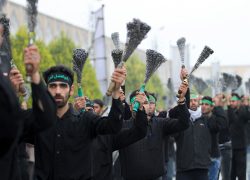Coffee has been popular in Nooshabad since about 450 to 500 years ago; however, it is not known when Nooshabadi coffee and its modern brewing method was invented.
According to the case registrant, there are no written sources to research on this topic, and the research sources are all limited to interviews conducted with local elders.
There are about nine baristas in Nooshabad, who make coffee in hussainiyas (congregation halls) and mosques.
In addition, this coffee is brewed by young people at homes and in religious ceremonies as well.
This coffee has traditionally been brewed with ingredients including coffee, cocoa, cardamom, sugar and cinnamon, and occasionally a little rose water is added to it, too.
Many types of coffee are prepared with cold water, but this one is made with boiling water.
It is made in special large copper cauldrons, in which, of course, nothing else can be made because they have absorbed the smell and fat of coffee.
Nooshabadi coffee has conventionally been served in funerals and memorial services as well as Muharram and Safar Observances, including on the death anniversaries of Imam Hussein and Imam Reza (peace be upon them) and also on the sixth day after Imam Hussein’s martyrdom anniversary.
This style of coffee is also made at the funerals of elderly people or people with a high social status, such as local clergy, prominent individuals, and village elders.
Oddly enough, it is not offered at the funeral of young people because the indigenous people believe it brings bad luck.
The inhabitants of Nooshabad maintain that coffee makes people feel happy and relaxed and comforts the mourners and the relatives of the deceased.







